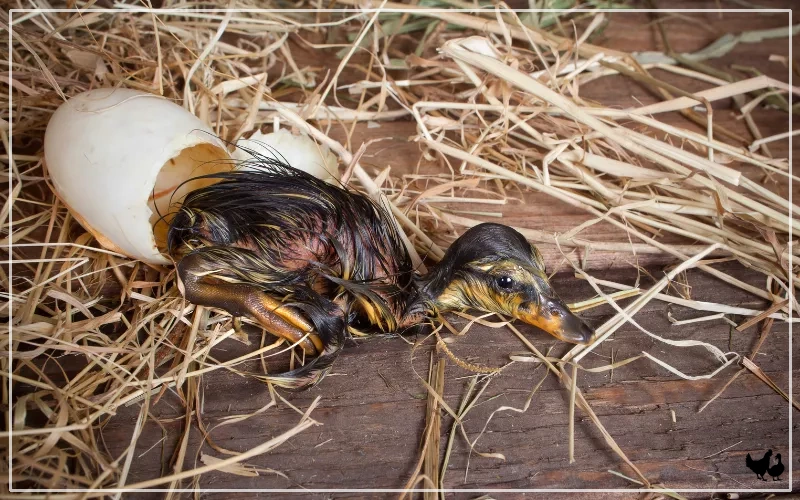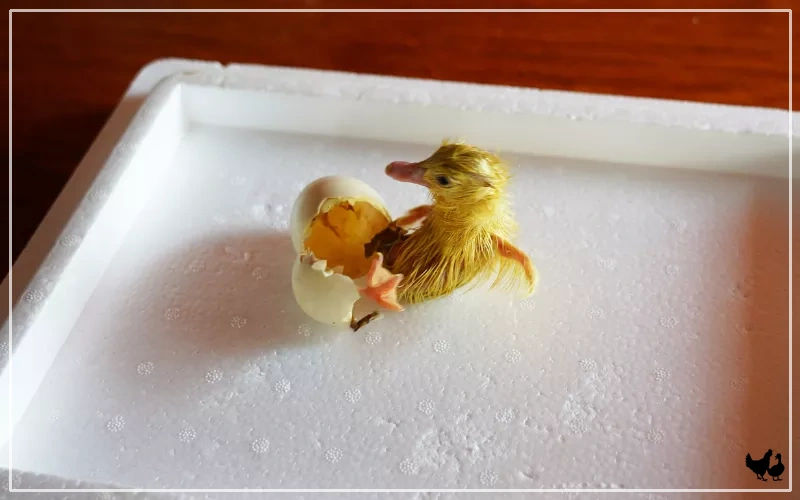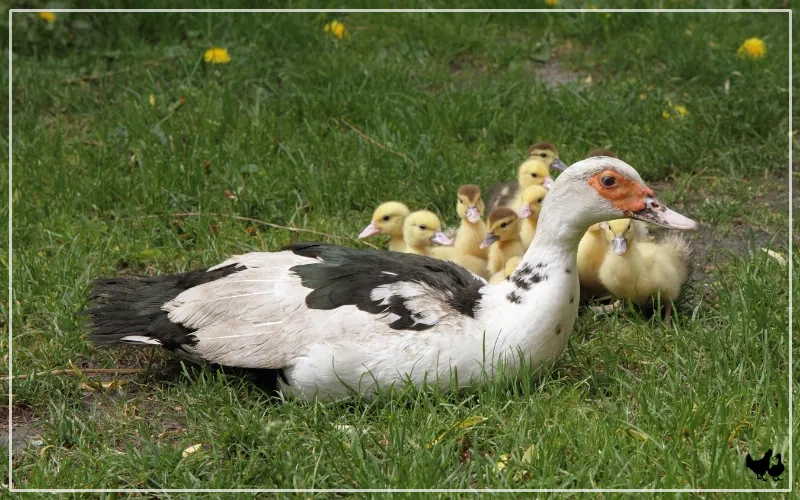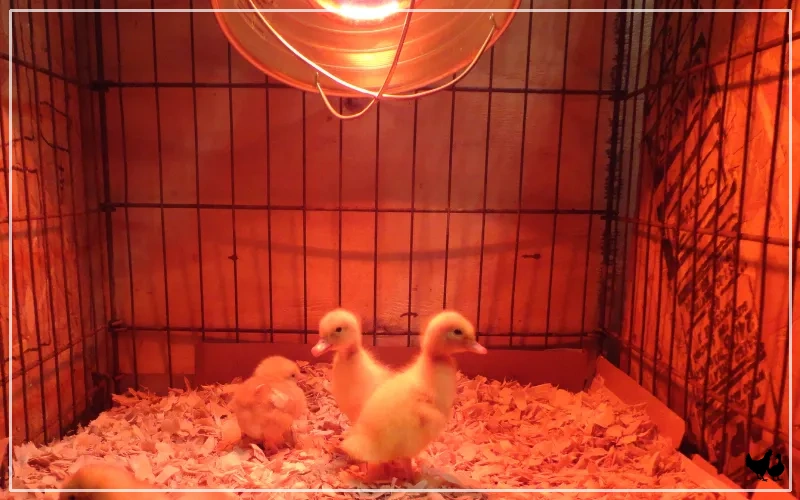How Long Do Ducks Take To Hatch?
Currently, more people are paying attention to what ends up on their plates as they become aware of some dangerous practices for growing food. Rearing poultry for meat and eggs is one of the first steps people take to ensure they get the healthiest meals.

While this generally meant keeping chickens in the past, most farmers are now opting for ducks because of their large nutritious eggs and copious amount of tasty meat.
To maintain your flock numbers, you should learn how ducks hatch their eggs for you to get ducklings. However, hatching duck eggs might not be as easy as chicken eggs because some duck breeds, like the Pekin, are good layers but get bored of sitting on their eggs.
In this case, you have to properly incubate the eggs to get healthy ducklings. The article below covers important tidbits on how long it takes for ducks to hatch, how to incubate their eggs, and how to care for the ducklings.
What Is The Incubation Period For Ducks?
The average incubation period for duck eggs is 28 days though it is about 35 days in some breeds. Knowing if your eggs have passed their hatching periods might be challenging. You can let duck eggs stay for about 35 days to see if they hatch unless they have visible signs of rotting.
Duck eggs, when laid, are inert. The incubation period will start when the egg is warm under the body of a mother duck or in an incubator. Their viability reduces with each day they are left in the cold. As such, collecting duck eggs daily is crucial.
You might choose to let the duck sit on her eggs, but this means placing them at risk of being abandoned when she gets bored. Trying to save the eggs when abandoned significantly reduces the odds of getting a duckling since the eggs’ viability will have reduced.

Factors That Influence The Incubation Period
While the incubation period for duck eggs is 28 days on average, here are the factors that influence this timeframe.
How Quickly The Duck Will Sit On Her Eggs
Ducks know how many eggs they will lay, so they can choose to lay all of them before they start sitting on them. Conversely, a duck might leave the eggs on which she is sitting to look for food. Few things will make you as anxious as coming across unattended eggs. If the mother duck takes more than a week before she starts sitting on her eggs, the eggs will have suffered a 3% loss.
If she waits for more than two weeks, the average egg loss is 10%. The eggs with some percentage lost will take longer to hatch and sometimes not hatch at all.
Duck Breed
Though you need 28 days for Pekin, Buff Orpington, Swedish, Saxony, and Cayuga ducks eggs and most breeds to hatch, some breeds will take longer. A Muscovy duck, for instance, needs 35 days for its eggs to hatch.
This might be because of the evolutionary history of different duck breeds. If you study this history, you will note that Muscovy ducks have a different ancestor hence their increased egg incubation period.
Incubating Humidity And Temperature Levels
When incubating, duck eggs should have average temperatures of 37.5 degrees Celsius or 99.5 degrees Fahrenheit. Moreover, they need environments with relative humidity levels of 55-65%. You should also maintain optimal ventilation levels for the eggs when using an incubator.
If duck eggs are left to incubate in temperature, ventilation, and humidity levels lower than recommended, they take more time to hatch.

Stages Of Duck Embryo Development
Early egg development stages happen in the mother duck rather than inside the egg. Here, the egg will develop from the inside out, meaning that the yolk grows first to serve as the embryo’s food source. The first cells, the gastrula, also develop around the yolk and will become different parts of a duck as the embryo develops. The shell develops last before the egg is laid.
After laying, the duck’s body heat raises the temperature of the eggs to a level that supports the division of embryonic cells. This division starts the magical transition of an egg into a duckling. As the embryo grows, the water in the egg is lost and replaced with air.
By day 25 of incubation, the air cell in a duck’s egg should fill a third of its interior space. Also, a healthy duckling embryo will weigh and feel about 15% lighter than the egg weighed at the start of incubation as the hatching date nears.
You can monitor your duck’s embryo development by candling the egg. This means looking at them under bright light. You might make the observations below:
- A clear egg after 14 weeks of incubation means your egg is infertile and should be removed from the clutch of those being incubated.
- A cloudy egg means that the embryo is dead or has started decaying, and the egg should thus be removed from the clutch you are incubating.
- An egg with a network of tissues and cells in a string-like network shows the embryo is developing well.
How Do Ducks Hatch From Eggs?
After incubation, it might take several hours for a duck to hatch from its egg. Below are the typical steps of the hatching process.

1. Internal Pip
This happens about a day or two before your eggs are due to hatch. The duckling will begin the process by using its bill to break the egg’s inner membrane into the air sac.
The duckling is not yet ready to hatch but has started breathing through the lungs instead of relying solely on the oxygen supplied by the allantois and chorion. You might hear a peep clearly at this time and even the duckling’s bill tapping on the egg’s inside.
2. External Pip
At this point, a duckling has cracked the eggshell. This takes place about 12-24 hours after an internal pip. Understandably, this is an exciting time for you but remember that you might not see any progress in the hatching process for about 12-24 hours after the star-shaped crack of the external pip generates.
The duckling, at this time, is absorbing the yolk sac protruding from its abdomen and waiting for the blood vessels connected to it to safely dry up so it can hatch without bleeding.

3. Zipping
After absorbing the yolk and drying the blood vessels, the duckling is ready to finish hatching. It will use its bill to crack the egg, often at the widest end. This is called zipping because the jagged crack created looks like a zipper. At this time, the duckling’s peeping is quite loud. Zipping often takes 1-3 hours but can sometimes take 12 hours.
4. Coming Out Of The Shell
When the crack is large enough, the duckling will push, squirm, and twist out of the eggshell. Usually, its head is tucked under one wing, and the bird flops in exhaustion after pulling its neck free from the shell.
How To Incubate Duck Eggs
When you want to ensure all your eggs safely and efficiently hatch, your best choice is to use an incubator. Here are the steps of incubating a duck’s egg.
- Place the incubator in the right location. This is ideally a level and stable one away from a heat source and fluctuating temperatures.
- Warm your incubator to about 98 degrees Fahrenheit for at least an hour before placing the egg inside.
- Pour Water Into A Specified Location In The Incubator.
- Place your eggs in the incubator with their pointed or narrow sides facing down.
- Rotate the eggs at least four times per day so that all angles are exposed to the required temperatures and develop concurrently. Some incubators have automatic turners to ease this. Stop rotating your eggs 3-5 days before their expected hatching so that ducklings can find the best pip spot when ready to hatch.

How To Care For Ducklings After Hatching
Ducklings do not need food for about a day after hatching because they are still full from the egg yolk their abdomens have absorbed. After 24 hours, transfer the ducklings into a brooder box that can be a large bin or tub lined with an old t-shirt or towel. Hang a bulb on the brooder’s side to keep the ducklings warm but leave enough room in their brooder for them to move away if it gets too warm.
Start the ducklings on a non-medicated chick mash and have a shallow dish of clean water for them to drink. The ducklings do not need to swim at this time. Familiarize them with the drinking water by dipping their bills in it a few times. Fragile ducklings should be protected from other household pets and young kids at this time.
Conclusion
Hatching duck eggs is fun. The process takes an average of 28 days from the time of incubation. It can take longer if the humidity and temperature levels during incubation are lower than ideal or if the mother duck takes time before sitting on the eggs.
When hatching, the process can take about 2-3 days, starting with an internal pip, proceeding to an external pip, then zipping, and finally breaking free from an eggshell.
After hatching, transfer the ducklings to a brooder and feed them after a day on non-medicated chick mash. Give them enough drinking water as well, and protect them from kids and other animals.



